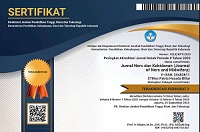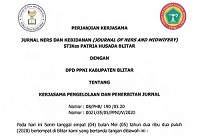The Effectiveness of Virgin Coconut Oil on the Decrease of Blood Glucose Levels on Gestational Diabetes Mellitus
DOI:
https://doi.org/10.26699/jnk.v8i3.ART.p271-275Keywords:
Virgin Coconut Oil, Blood Glucose Level, Gestational Diabetes Mellitus, HypoglyicemicAbstract
Gestational Diabetes Mellitus (GDM) was medical complication that occurs during pregnancy and caused preterm labor. Efforts reduce blood glucose levels and improve pancreatic performance must be safe both for mother and fetus. The research aimed to prove VCO can reduce blood glucose levels in GDM. The research design was quasi-experimental with one group pre-test and post-test. The research started on March to September 2020. The population was pregnant mother with GDM from two hospitals in Mojokerto East Java. The sample was 46 respondents with purposive sampling. The treatment given was VCO at a dose of 5 ml, 6 times a day and lowcarb diet. The instrument used to measure the fasting blood glucose was glucose stick. The data was analyzed with paired t-test. The result showed blood glucose levels before intervention average of 155.19 mg/dL and after 153.50 mg/dL. The t-test value 14.442 and p value 0.000 which meant that VCO and low carb diet was more effective in reducing blood glucose levels on GDM. The administration of VCO with a low carb diet is an effort to restrict glucose intake in the body without hypoglycemia. It is safe to use for both mother and fetus as an alternative non-pharmacological therapy on GDM and prevent preterm laborReferences
American Diabetes Association (2015) ‘12. Management of diabetes in pregnancy’, Diabetes Care, 38(January), pp. S77–S79. doi: 10.2337/dc15-S015.
Daundasekara, S. S. et al. (2017) ‘Validation of the intuitive Eating Scale for pregnant women’, Appetite, 112, pp. 201–209. doi: 10.1016/j.appet.2017.02.001.
Iranloye, B., Oludare, G. and Olubiyi, M. (2013) ‘Anti-diabetic and antioxidant effects of virgin coconut oil in alloxan induced diabetic male Sprague Dawley rats’, Journal of Diabetes Mellitus, 03(04), pp. 221–226. doi: 10.4236/jdm.2013.34034.
Ji, W.W., Yu, D.A., Fan, M., You, M., Lu, Y., Li, E.B., Xie, N. and Yan, S. S. (2017) ‘Effects of GW002, a novel recombinant human glucagon-like peptide-1 (GLP-1) analog fusion protein, on CHO recombinant cells and BKS-db mice.’, Acta diabetologica, 54(7), pp. 685–693.
Joeliantina, A. et al. (2019) ‘Family support for diabetes self-care behavior in t2dm patients who use herbs as a complementary treatment’, Medico-Legal Update, 19(1), pp. 238–243. doi: 10.5958/0974-1283.2019.00048.3.
Kabisch, S. et al. (2018) ‘Liver fat scores moderately reflect interventional changes in liver fat content by a low-fat diet but not by a low-carb diet’, Nutrients, 10(2). doi: 10.3390/nu10020157.
Purnamasari, D., Waspadji, S., Adam, J. M., Rudijanto, A., & Tahapary, D. (2013) ‘Indonesian Clinical Practice Guidelines for Diabetes in Pregnancy’, Journal of the ASEAN Federation of Endocrine Societies, 28(1), pp. 9–9.
Saudah, N. et al. (2015) ‘Model of Independency Mother in Caring for Preterm Infant based on Experiential Learning Care (ELC)’, International Journal of Evaluation and Research in Education (IJERE), 4(4), p. 200. doi: 10.11591/ijere.v4i4.4512.
Setiadi (2013) Konsep dan Praktik Penulisan Riset Keperawatan. 2nd edn. Jogjakarta: Graha Ilmu.
Setyorogo, S. and Trisnawati, S. . (2013) ‘Faktor Resiko Kejadian Diabetes Melitus Tipe II Di Puskesmas Kecamatan Cengkareng Jakarta Barat Tahun 2012’, Jurnal Ilmiah Kesehatan, 5(1), pp. 6–11.
Soelistijo, S.A., Novida, H., Rudijanto, A., Soewondo, P., Suastika, K., Manaf, A., Sanusi, H., Lindarto, D., Shahab, A., Pramono, B. and Langi, Y. (2015) ‘Konsensus pengelolaan dan pencegahan diabetes melitus tipe 2 di Indonesia’, Jakarta: PB Perkeni, pp. 1–93.
Soliman, A.M., Lin, T.S., Ghafar, N.A. and Das, S. (2018) ‘Virgin coconut oil and diabetic wound healing: histopathological and biochemical analysis.’, Eur. j. anat, pp. 135–144.
Stocker, R.K., Bally, L., Nuoffer, J.M. and Stanga, Z. (2019) ‘Ketogenic diet and its evidence-based therapeutic implementation in endocrine diseases’, Praxis, 108(8), p. pp.541-553.
Tebbani, F., Oulamara, H. and Agli, A. (2017) ‘Early weight gain during pregnancy: Which women are the most affected?’, International Journal of Medical Science and Public Health, p. 1. doi: 10.5455/ijmsph.2017.0208623012017.
WHO (2013) Diagnostic and Classification of Hyperglicemia First Detection in Pregnancy, WHO.
Downloads
Additional Files
Published
How to Cite
Issue
Section
License
Copyright (c) 2021 Jurnal Ners dan Kebidanan (Journal of Ners and Midwifery)

This work is licensed under a Creative Commons Attribution-ShareAlike 4.0 International License.






